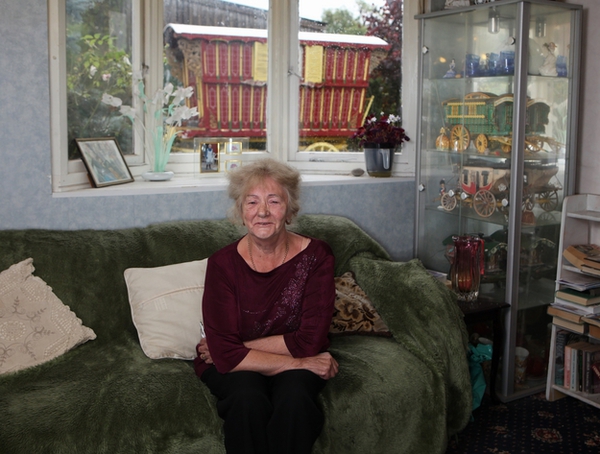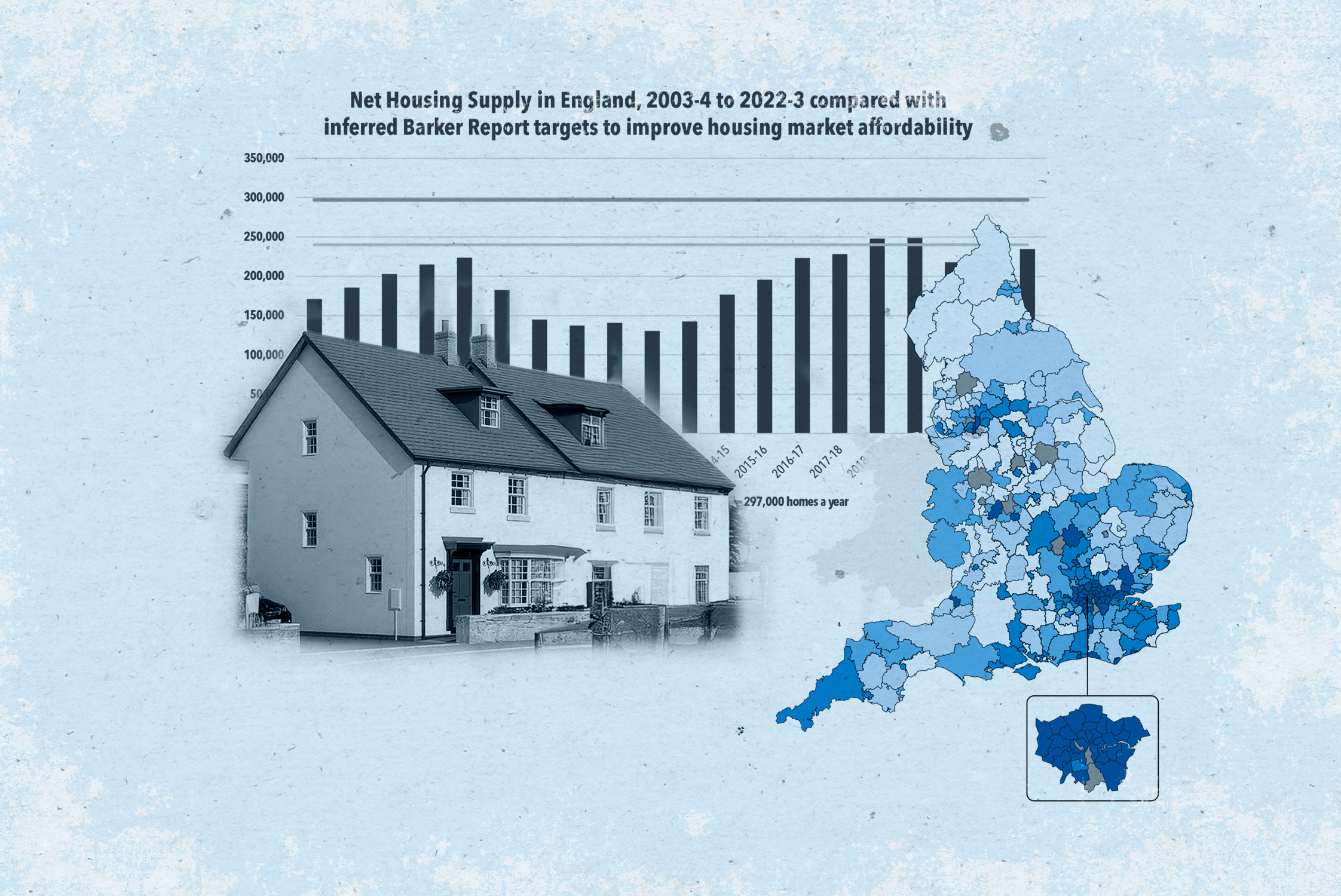Romany soldier
Maggie Smith-Bendell has spent 20 years fighting for the rights of Gypsies and Travellers to build on their own land. Now she has a new enemy in communities secretary Eric Pickles and she’s prepared to pitch her wagon outside parliament to make her voice heard. Emily Twinch reports.
‘Generation after generation, the Romany Gypsy never stops trying to prove to people we are not what you think we are.’
So says Maggie Smith-Bendell, a high-profile campaigner for Romany Gypsies and a self-taught planning expert. ‘There are so many myths,’ she explains. ‘People think we are thieves, vagabonds and don’t pay [our way]. But we do pay. We pay everything you pay.’
Ms Smith-Bendell has dedicated her life to fighting this historic prejudice in order to defend their planning rights. What Gypsies are, she explains from her mobile home in the Somerset village of Ashcott, is nomads; if they buy land and construct anything, it tends to be mobile homes, a base from which to travel, often in search of seasonal work.
Yet to your average ‘gorgie’ - as she calls non-Romanies - a nomadic Gypsy neighbour is rarely a welcome prospect. So, for the past 20 years,
Ms Smith-Bendell has worked with lawyers, the police, pressure groups and councils all over the UK, to help Romany families secure planning permission to build their bases on their own land just as she has done.
A gathering storm
Last month the 69-year-old nomad turned mobile home-dweller republished her book, Rabbit Stew and a Penny or Two, in order to educate us gorgies on Gypsy culture. The book charts her life from her childhood with her parents and eight siblings to the present day and reflects on the historic oppression Romany Gypsies have faced since the 16th century, when King Edward VI passed laws ordering Gypsies to be branded and enslaved.
Now Ms Smith-Bendell is working on a new book. This time she is teaching people about the history of Romany Gypsies and the planning system. With an overhaul of the planning system threatening the Gypsy and Traveller way of life, this book could not be more timely. Six months into the coalition government’s tenure, it has slashed funding for new Gypsy and Traveller sites, and made it harder for them to get planning consent.
With increased demand for sites and plans to give communities a greater say on new developments expected to increase opposition, Ms Smith-Bendell says the Romany Gypsy wagons are ready to roll up to the Houses of Parliament if the coalition does not seek to increase the number of Gypsy and Traveller pitches in England. ‘We are not going to shut up any more,’ she says. ‘There is a need for pitches. If they [the government] don’t provide them and there’s a need for a protest, then there will be one.’
New pitches look increasingly unlikely. The last government pledged £97 million to increase the number of such sites between 2008 and 2011, which dropped to £64 million when the Homes and Communities Agency took over the programme last year. This was a blow for Gypsy and Traveller communities, but it was nothing compared with what was to come. This summer, Inside Housing discovered that just £1.5 million of the £17 million allocated to councils for 2009/10 was actually spent. And since coming into office, communities secretary Eric Pickles has scrapped the £32 million earmarked for this financial year entirely (Inside Housing, 20 August 2010).
Ms Smith-Bendell is warning that the cuts will force many more Gypsies back on the road. Already the Communities and Local Government department’s bi-annual caravan count, which indicates the number of non-settled Gypsies and Travellers on the road, reveals there were 18,355 Gypsy and Traveller caravans in England in January 2010, up 5 per cent in July last year. This compares to a 2 per cent yearly rise in the number of pitches provided by local authorities and housing associations in England in January this year, up to 4,918.
Protecting a way of life
Ms Smith-Bendell’s own story reveals why assimilating into wider society isn’t a straightforward option for Romany Gypsies. She incurred the disapproval of her parents when she decided to marry her ‘gorgie mush [man]’ at the age of 20. ‘I was always made to know he was not one of us,’ she says. She first went to live with her husband Terry, with whom she has had two children, in a flat in Bristol where she tried to adapt to a settled life.
‘If you went into my garden and got a bird and put it in a cage, it would stop singing. We [Gypsies] have got an aversion to bricks and mortar,’ she says of how conventional living made her feel.
To understand this better, I meet Ms Smith-Bendell in her current home on a cold, rainy autumn day. She has spent the past 15 years living here in a hybrid of a traditional Gypsy lifestyle and everyday village living. Despite residing in such a quaint, settled community, she has managed to avoid being trapped by bricks and mortar. Entering the gates of her premises, the words ‘grys poove’ - meaning horsefield - greet the visitor. A brightly coloured 19th-century Gypsy wagon - one of three Ms Smith-Bendell owns - is immediately visible.
Ms Smith-Bendell is a friendly, welcoming lady, worried about how her hair will come out in the photographs. But when the topic turns to the communities secretary she reveals her fighting spirit.
‘I would give him a new title - Judge Pickles - because he has made himself judge and jury over every Gypsy in the country with what he is going to do with us if we don’t conform [to new planning laws],’ she says.
Since coming to power the coalition has scrapped regional special strategies, leaving it up to councils to determine the need for Gypsy and Traveller accommodation provision as part of its localism agenda.
Today, Ms Smith-Bendell estimates there is a need for much more than the generally accepted figure of 4,000 pitches in England - largely due to a lack of significant site permission since the 1960s. ‘I think it’s a lot higher than that,’ she says.
However, despite this increased demand, Gypsy and Traveller groups fear councils are less likely than ever to build more pitches. The Chartered Institute of Housing and National Housing Federation have both voiced concerns that, if not managed correctly, localism could equate to a ‘nimby’s charter’, meaning planning committees will be disinclined to give planning permission for Travellers’ private sites or new authorised sites.
Land of their own
This alone would appear to be bad news for Gypsies; but even if councils do find the cash and grant planning consent, it’s far from a perfect solution for some Romanies. ‘This [new planning framework] is leaving councils to use their own and taxpayers’ money to build local authority sites that Romany Gypsies don’t want anyway,’ explains Ms Smith-Bendell. This, she says, is because many Romanies prefer to live surrounded by their extended families, which is not usually an option on council sites where pitches are allocated according to availability.
Instead, many want to buy and build on their own land where they can live with family. Yet about 80 per cent of Romany Gypsy applications to build on their own land are turned down, Ms Smith-Bendell estimates. With the advent of localism, this looks like it could get even higher.
She says if families try to go through the proper channels, local opposition often means a planning application will fail and an injunction might be taken out against them. As a result, they feel they are left with no alternative but to apply for planning permission retrospectively - partly as a form of protest.
‘We use retrospective planning to bring the problem to the fore now,’ she says of a practice Mr Pickles terms ‘an abuse of the planning system’. ‘Even if a piece of land ticks all the boxes, there’s so much opposition from the local community we will leave it up to a planning inspector to say yes [retrospectively].’
Mr Pickles says the changes to the planning system will put Gypsies and Travellers who ‘play by the rules’ on an ‘equal footing’ to settled communities. ‘Unauthorised developments have created tensions between Travellers and the settled population,’ he adds.
Ms Smith-Bendell learned all this the hard way. Today she is settled in Ashcott, but it was the difficulty she had getting planning permission for her mobile home 20 years ago that prompted her to help other families who are in the same boat.
Now, as a result of her experience, she commands the respect of some influential figures - Liberal Democrat peer Lord Eric Avebury for one. ‘She has been an activist on these [planning] problems for many years and an effective one at that,’ he says. ‘I’m in touch with her regularly by email and I rely on her for advice because it gets to the heart of the matter.’
She still tries to live according to her traditions. Her bathroom and cooking area are located in a room separate from her mobile home, because you never ‘do things to the body in the same place as you live’. The bathroom and kitchen installed in her home itself are ‘for show’. Until last year she still had driving horses and a foal on her two acres of land - which originally belonged to her father - and she and Terry used to take the wagons out on tours.
But she has also had to adapt. Her stew pot sits on a wood-burner, not a ‘Queenie’, as Gypsies traditionally cooked on. And when I ask whether she cooks the traditional rabbit stew her first book refers to so fondly in its title, she replies: ‘No Romany Gypsy will eat rabbit since Myxomatosis [a viral epidemic affecting rabbits].’ She will make a stew, but it’s more likely to be with beef or chicken these days.
Perhaps this is what all Romany Gypsies will have to do to protect their way of life: adapt their traditions to the modern world.
To stand a chance in this battle, Ms Smith-Bendell knows Gypsies must beat the planning system. Already, she says, they have become smarter and more clued-up on planning and other laws. Her next book could be an important weapon in this fight.
The Romany Gypsy: a wanderful life
There is some debate as to the early origins of the Gypsy, but a general view is that they originated as ancient warrior classes in north-western India.
It is believed Gypsies started to emigrate in the 11th century and first began to appear in Europe in the early 15th century.
They gained a reputation as fortune tellers and magicians and described themselves as dukes or princes of Egypt. It has been suggested the name ‘Gypsy’ comes from ‘little Egyptian’ and ‘Romany’ from their nomadic way of life.
In the 1930s and 1940s, the Nazis in Europe imprisoned and murdered around 500,000 Romany Gypsies.
Famous people with Romany Gypsy roots include singer David Essex, comedian Charlie Chaplin and actors Michael Caine and Bob Hoskins.








